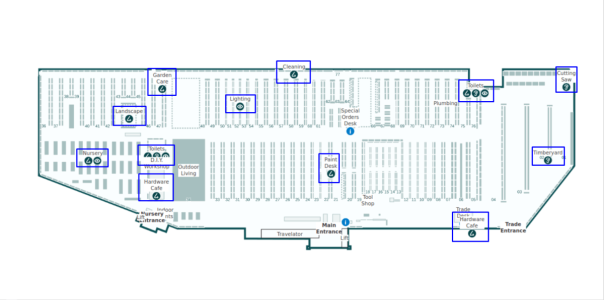Bunnings unveils new inclusive feature set to benefit thousands
- Replies 21
Bunnings is hoping that its new feature, designed to make shopping easier for thousands of customers, will create a more inclusive and welcoming atmosphere at its stores.
The hardware chain has unveiled ‘sensory maps’ for every store across Australia and New Zealand, as part of its efforts to ensure its stores provide a comfortable shopping experience for all customers.
The maps can be found in the store locator section of the Bunnings website, and are designed to help customers find areas of a store that may have bright lights, loud noises and strong odours, which may be difficult for customers with sensory processing issues, such as those with Sensory Processing Disorder or autism.
The idea behind the sensory maps originated with Amaze, a non-profit organisation that provides family support and resources for individuals living with autism.
Amaze estimates that one per cent of Australians — about 260,000 — are living with autism, with forty per cent of those finding it impossible to leave home and fifty-two per cent feeling socially excluded.

'We’re really pleased to have rolled out sensory maps for every Bunnings store across Australia and New Zealand, which we hope will be a helpful tool for our customers with sensory restrictions,' said Ryan Baker, Bunnings' Chief Customer Officer.
'We know there are some areas of our stores that may have loud noises, strong smells or bright lights, such as our nursery and timberyard. The sensory maps will allow customers to identify these locations specific to their local store,' he continued.
‘We want all our stores to be a welcoming and inclusive place for everyone, and hope these maps help ensure customers have a great experience every time they shop with us.’
‘Customers can access the maps by visiting our website or by asking one of our team members for assistance at their local store.’
This move by Bunnings follows stores like Coles, Woolworths, and IGA which earlier introduced their own inclusivity programs to create a sensory-friendly shopping experience.
These retailers have enacted Quiet Hours over the past years, which is pretty much what it’s called — 60 minutes of muted sounds and toned-down lighting to make the shopping experience less overwhelming.
Advocates for neurodivergent persons have lauded the retailers’ initiatives in the past.
Sandra Thom-Jones, a leading researcher for autism, who was also diagnosed at 52 years old, said last year that the normal sights and sounds of grocery shopping can be difficult for those with sensory conditions as they tend to take everything that’s happening into account as opposed to others who can tune stimuli out and focus on whatever they’re doing in-store.
On that note, other people without sensory overload issues have also expressed their appreciation for the small pocket of peace and tranquillity that Quiet Hours offer.
Member @Justme49 said of Woolworths: ‘I was in (there) when they went “quiet”. What a lovely idea, (it) was so peaceful. I could actually think while shopping.’
Member @JayKay also shared their appreciation for the effort on behalf of her son who also has issues with bright light and noise.
‘My son, in his mid-thirties, doing his PhD, suffers from a very rare learning difficulty which makes writing his thoughts down very hard for him,’ they said.
‘Over the years, he has developed strategies to help this, but part of (this) disorder (Dysgraphia) is extreme intolerance to bright light and disorganised noise.’
‘He wears sunglasses all year, even in shops with bright lights. He cannot travel on public transport during peak hours and wears earplugs when at train stations in Sydney. The announcements are too loud, and people chattering causes him to become disoriented and confused.
They also said their son shopped late to avoid noisy crowds.
‘It is an awkward problem to deal with, so Woolies catering for those who'd appreciate Quiet Hour, for whatever reasons, well done!’
 Hopefully, more retailers will release similarly inclusive policies for those of us who see, hear, and feel the world in a different way.
Hopefully, more retailers will release similarly inclusive policies for those of us who see, hear, and feel the world in a different way.
Maybe they should take cues from ALDI shoppers who helped the mum of a child with autism when she was feeling overwhelmed, or the hundreds of BIG W customers nationwide who gave another mum the shock of her life when they responded to an appeal she made for her neurodivergent son.
On that note, Aussies with more questions about autism and related neurodivergent characteristics can click here for Aware Australia’s convenient directory of relevant resources.
Aware Australia can also be reached by phone at 1300 308 699 or via email at [email protected].
How about you: have you ever visited a store and felt challenged by the lighting or noise levels? How do you cope with situations like this outside of Quiet Hours?
Do you think Bunnings' latest initiative will help those with sensory considerations?
Tell us your thoughts below!
The hardware chain has unveiled ‘sensory maps’ for every store across Australia and New Zealand, as part of its efforts to ensure its stores provide a comfortable shopping experience for all customers.
The maps can be found in the store locator section of the Bunnings website, and are designed to help customers find areas of a store that may have bright lights, loud noises and strong odours, which may be difficult for customers with sensory processing issues, such as those with Sensory Processing Disorder or autism.
The idea behind the sensory maps originated with Amaze, a non-profit organisation that provides family support and resources for individuals living with autism.
Amaze estimates that one per cent of Australians — about 260,000 — are living with autism, with forty per cent of those finding it impossible to leave home and fifty-two per cent feeling socially excluded.

The store map for this Bunnings in QLD already reflects the new feature, with customers being given a heads up of which areas have loud sounds, brighter lights, and stronger scents. Image Credit: Bunnings
'We’re really pleased to have rolled out sensory maps for every Bunnings store across Australia and New Zealand, which we hope will be a helpful tool for our customers with sensory restrictions,' said Ryan Baker, Bunnings' Chief Customer Officer.
'We know there are some areas of our stores that may have loud noises, strong smells or bright lights, such as our nursery and timberyard. The sensory maps will allow customers to identify these locations specific to their local store,' he continued.
‘We want all our stores to be a welcoming and inclusive place for everyone, and hope these maps help ensure customers have a great experience every time they shop with us.’
‘Customers can access the maps by visiting our website or by asking one of our team members for assistance at their local store.’
This move by Bunnings follows stores like Coles, Woolworths, and IGA which earlier introduced their own inclusivity programs to create a sensory-friendly shopping experience.
These retailers have enacted Quiet Hours over the past years, which is pretty much what it’s called — 60 minutes of muted sounds and toned-down lighting to make the shopping experience less overwhelming.
Advocates for neurodivergent persons have lauded the retailers’ initiatives in the past.
Sandra Thom-Jones, a leading researcher for autism, who was also diagnosed at 52 years old, said last year that the normal sights and sounds of grocery shopping can be difficult for those with sensory conditions as they tend to take everything that’s happening into account as opposed to others who can tune stimuli out and focus on whatever they’re doing in-store.
On that note, other people without sensory overload issues have also expressed their appreciation for the small pocket of peace and tranquillity that Quiet Hours offer.
Member @Justme49 said of Woolworths: ‘I was in (there) when they went “quiet”. What a lovely idea, (it) was so peaceful. I could actually think while shopping.’
Member @JayKay also shared their appreciation for the effort on behalf of her son who also has issues with bright light and noise.
‘My son, in his mid-thirties, doing his PhD, suffers from a very rare learning difficulty which makes writing his thoughts down very hard for him,’ they said.
‘Over the years, he has developed strategies to help this, but part of (this) disorder (Dysgraphia) is extreme intolerance to bright light and disorganised noise.’
‘He wears sunglasses all year, even in shops with bright lights. He cannot travel on public transport during peak hours and wears earplugs when at train stations in Sydney. The announcements are too loud, and people chattering causes him to become disoriented and confused.
They also said their son shopped late to avoid noisy crowds.
‘It is an awkward problem to deal with, so Woolies catering for those who'd appreciate Quiet Hour, for whatever reasons, well done!’
Key Takeaways
- Bunnings has introduced 'sensory maps' for all its stores to provide an improved shopping experience for customers with sensory processing issues.
- This move follows similar initiatives from retailers like Coles, Woolworths, and IGA.
- The sensory maps feature areas where customers may encounter bright lights, loud noises and strong odours.
- Bunnings' Chief Customer Officer Ryan Baker said they want to make shopping at the hardware store a welcoming and inclusive experience for everyone.
Maybe they should take cues from ALDI shoppers who helped the mum of a child with autism when she was feeling overwhelmed, or the hundreds of BIG W customers nationwide who gave another mum the shock of her life when they responded to an appeal she made for her neurodivergent son.
On that note, Aussies with more questions about autism and related neurodivergent characteristics can click here for Aware Australia’s convenient directory of relevant resources.
Aware Australia can also be reached by phone at 1300 308 699 or via email at [email protected].
How about you: have you ever visited a store and felt challenged by the lighting or noise levels? How do you cope with situations like this outside of Quiet Hours?
Do you think Bunnings' latest initiative will help those with sensory considerations?
Tell us your thoughts below!








